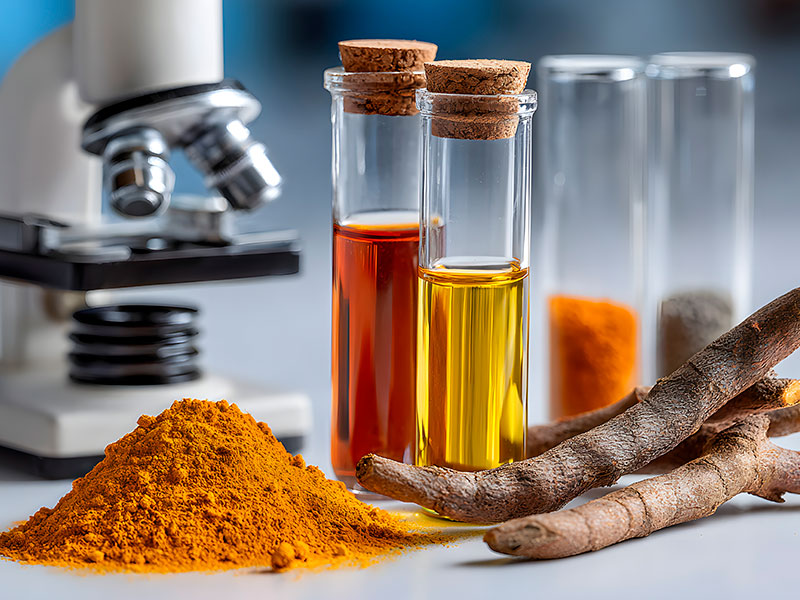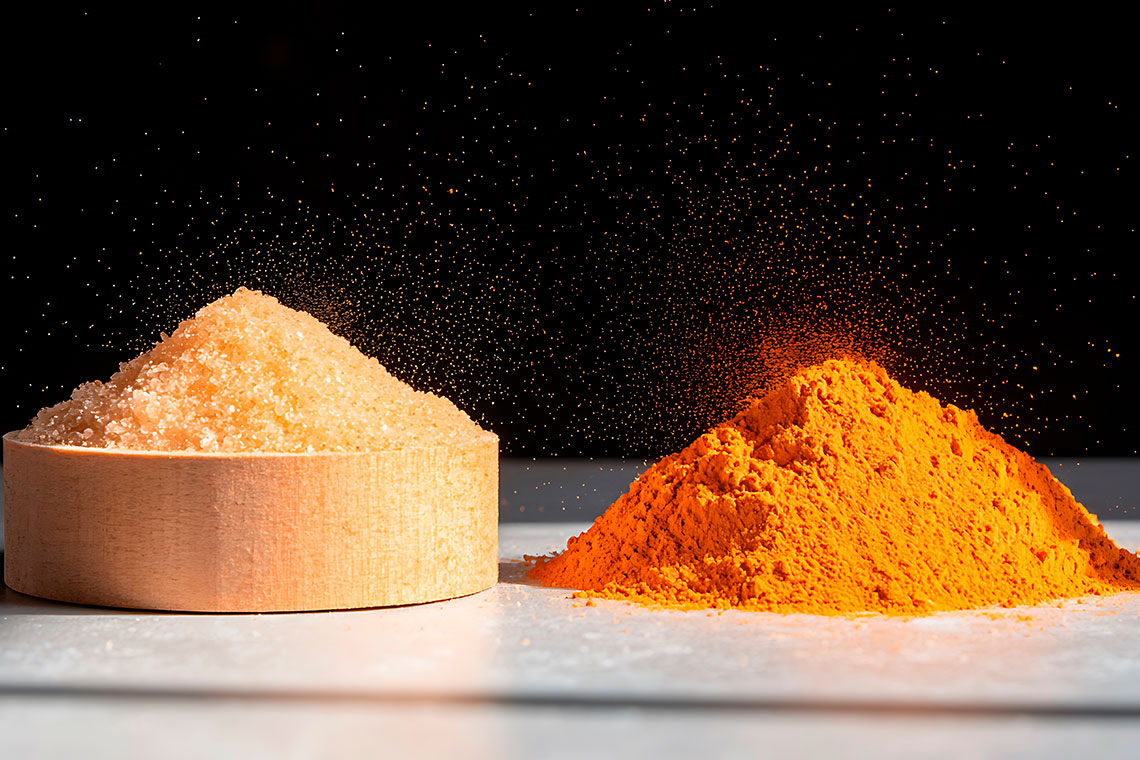Questions about combining dietary supplements with prescription medications arise frequently, particularly when it comes to popular supplements like turmeric and ginger when used alongside medications like Cymbalta or Jardiance.
Turmeric and ginger rank among the most popular dietary supplements, with people using them for various health reasons ranging from joint support to digestive wellness. Data from the CDC shows that 57.6 percent of U.S. adults used any dietary supplement in the past 30 days.
Understanding how these supplements might interact with medications requires examining what research exists and acknowledging where significant information gaps remain.
The Reality of Supplement Research
Supplement manufacturers face different regulatory requirements than pharmaceutical companies when it comes to interaction testing. While drug makers must conduct extensive studies examining how their medications interact with other drugs, supplement companies have no such requirements for interaction research.
This regulatory difference creates significant information gaps that affect both patients and healthcare providers.
When healthcare providers advise caution about supplements alongside prescription medications, the recommendation often stems from limited available data rather than documented problems. However, the absence of interaction studies doesn’t indicate that supplements are automatically safe or that they are dangerous when taken with prescription medications.
Information about interactions typically comes from isolated case reports, small studies, and laboratory research that may not directly apply to real-world use. Most interaction warnings found online are based on theoretical concerns rather than documented adverse events in patients.
The FDA regulates dietary supplements as food products rather than pharmaceuticals, meaning they don’t require safety or efficacy proof before reaching consumers. This regulatory framework places responsibility on individuals to research potential interactions, despite limited available information.
These limitations explain why definitive answers about supplement interactions are difficult to find and why healthcare providers often recommend cautious approaches when discussing supplement use with prescription medications. The lack of required testing doesn’t mean interactions don’t exist, but rather that we often don’t have the data needed to make definitive safety determinations.
Turmeric Under the Microscope
Turmeric supplements contain curcumin, the active compound responsible for the spice’s characteristic yellow color. People use turmeric supplements for various health purposes, often consuming doses significantly higher than those obtained through culinary use of the spice.
The primary concern regarding turmeric supplements involves potential anticoagulant effects. Curcumin might influence blood clotting mechanisms, which could theoretically increase the bleeding risk when combined with certain medications.
For individuals taking Cymbalta, medical literature contains no documented cases of problematic interactions with turmeric supplements.
Cymbalta affects brain neurotransmitters, which is how it treats depression and certain chronic pain conditions. Curcumin’s effects on blood clotting wouldn’t be expected to interfere with Cymbalta’s mechanism of action. However, there are serotonin receptors in the stomach that Cymbalta may affect, which can lead to an increased risk of bleeding when taken with anticoagulants. The risk of an interaction with turmeric is theoretical, but make sure to tell your doctor if you are taking both of these substances.
People using Jardiance might question turmeric’s potential effects on blood glucose, since some research suggests curcumin could influence glucose metabolism. However, any such effects appear modest and wouldn’t necessarily cause complications for individuals taking Jardiance for diabetes management.
Most people taking turmeric supplements alongside either Cymbalta or Jardiance don’t report obvious adverse effects.
While this observation doesn’t guarantee universal safety, it suggests that serious interactions are likely uncommon. Greater concern might focus on supplement quality and dosage, since turmeric products vary considerably in curcumin content and bioavailability.
Culinary use of turmeric in cooking is unlikely to cause medication interactions, since food-level consumption provides much lower concentrations than supplement formulations. The distinction between dietary and medicinal doses becomes important when evaluating potential interaction risks.

Ginger’s Double Life as Food and Medicine
Ginger serves both as a common culinary ingredient and a popular medicinal supplement. People use ginger supplements for nausea relief, digestive support, and inflammation management, often consuming concentrated doses that exceed amounts typically used in cooking.
Similar to turmeric, ginger possesses anticoagulant properties that generate theoretical interaction concerns. Ginger, like turmeric, might affect blood clotting mechanisms, though the clinical significance of these effects remains unclear for most people taking prescription medications.
For those who take Cymbalta, the medical literature contains no documented evidence of problematic interactions with ginger supplements. The mechanisms by which each substance operates in the body differ sufficiently that direct interference appears unlikely.
Those taking Jardiance might be interested in ginger’s potential effects on blood glucose levels. Limited studies suggest ginger could support glucose control, which might theoretically enhance Jardiance’s blood sugar-lowering effects.
Any such interaction would likely be modest and potentially beneficial rather than harmful. The primary consideration for diabetes patients might involve monitoring blood glucose levels when adding ginger supplements to ensure overall glucose control remains stable.
The difference between consuming fresh ginger in cooking versus taking concentrated ginger supplements is significant. Culinary preparations like ginger tea or fresh ginger in cooking contain substantially smaller amounts of active compounds compared to standardized supplement extracts.
Most people can continue using ginger in cooking while taking either Cymbalta or Jardiance without concern. Supplement doses require more careful consideration and potentially enhanced monitoring.
Working with Your Healthcare Provider on Supplement Questions
Healthcare providers approach supplement discussions from a position of ensuring patient safety, particularly when comprehensive interaction data is limited. When providers recommend caution with supplements alongside prescription medications, this guidance stems from a commitment to avoiding potential complications rather than opposition to supplement use.
Productive conversations with healthcare providers focus on individual circumstances and risk-benefit considerations for specific supplements.
Rather than seeking absolute guarantees about supplement safety, patients can discuss their health goals and whether supplements align with their overall treatment plan. These discussions work best when patients come prepared with specific information about the supplements they’re considering, including dosages and intended purposes.
Providing complete information about current supplement use, including specific products and dosages, helps healthcare providers make informed recommendations. This transparency allows for more personalized guidance based on individual health conditions and medication regimens.
Healthcare providers can evaluate personal risk factors that might influence supplement safety considerations. Patients taking multiple medications that affect blood clotting, for example, might need different guidance about turmeric supplements compared to those with simpler medication regimens.
Some providers may recommend starting with lower supplement doses and monitoring for changes in medication effectiveness or side effects. Others might suggest timing supplements and medications at different times of day to minimize potential interactions.
Effective healthcare partnerships acknowledge both the patient’s interest in complementary approaches and the importance of maintaining proven prescription medication therapy. Open communication about supplement use supports this collaborative approach to healthcare management.

The RX Advocates Make Medications You Need More Affordable
Managing prescription medication costs shouldn’t prevent you from getting the treatments you need. Whether you’re taking Cymbalta for depression or chronic pain, or Jardiance for diabetes management, consistent access to your prescribed medications remains the foundation of effective treatment.
The RX Advocates specializes in helping people access prescription medications affordably through manufacturer assistance programs and other cost-reduction strategies. We understand that medication expenses can create financial stress that affects treatment decisions.
Our patient assistance programs work directly with pharmaceutical companies to help eligible individuals receive their prescribed medications at reduced costs or sometimes at no cost. We handle the application processes and coordinate with manufacturers to ensure you get the maximum available assistance.
Don’t let medication costs drive decisions about supplement use or prescription adherence. Contact The RX Advocates at 844-559-8332 to learn about assistance options for your specific medications and take control of your healthcare expenses.

